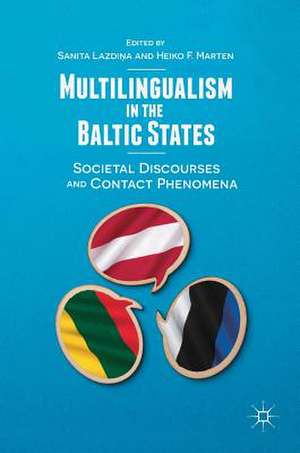Multilingualism in the Baltic States: Societal Discourses and Contact Phenomena
Editat de Sanita Lazdiņa, Heiko F. Martenen Limba Engleză Hardback – 21 noi 2018
Preț: 794.07 lei
Preț vechi: 968.38 lei
-18% Nou
Puncte Express: 1191
Preț estimativ în valută:
151.95€ • 156.76$ • 126.80£
151.95€ • 156.76$ • 126.80£
Carte tipărită la comandă
Livrare economică 27 martie-10 aprilie
Preluare comenzi: 021 569.72.76
Specificații
ISBN-13: 9781137569134
ISBN-10: 1137569131
Pagini: 384
Ilustrații: XXIV, 515 p. 41 illus.
Dimensiuni: 148 x 210 mm
Greutate: 0.79 kg
Ediția:1st ed. 2019
Editura: Palgrave Macmillan UK
Colecția Palgrave Macmillan
Locul publicării:London, United Kingdom
ISBN-10: 1137569131
Pagini: 384
Ilustrații: XXIV, 515 p. 41 illus.
Dimensiuni: 148 x 210 mm
Greutate: 0.79 kg
Ediția:1st ed. 2019
Editura: Palgrave Macmillan UK
Colecția Palgrave Macmillan
Locul publicării:London, United Kingdom
Cuprins
Chapter 1: Multilingualism, Language Contact and Majority-Minority Relations in Contemporary Estonia, Latvia and Lithuania; Sanita Lazdiņa and Heiko F. Marten.- Part I: Introduction.- Chapter 2: Language Policy, External Political Pressure and Internal Linguistic Change: the Particularity of the Baltic Case; Uldis Ozolins.- Part II: Regional Varieties and Minority Languages.- Chapter 3: Latgalian in Latvia: Laypersons’ Regards to Status and Processes of Revitalization; Sanita Lazdiņa.- Chapter 4: Contested counting? What the Census and Schools Reveal about Võro in Southeastern Estonia; Kara D. Brown and Kadri Koreinik.- Chapter 5: Regional Dialects in the Lithuanian Urban Space: Skills, Practices and Attitudes; Meilutė Ramonienė.- Chapter 6: Tangled Language Policies – Polish in Lithuania vs. Lithuanian in Poland; Justyna Walkowiak and Tomasz Wicherkiewicz.- Part III: The Integration of the Russian Language and Its Speakers into Baltic Societies.- Chapter 7: Lithuanian as L2: a Case Study of Russian Minority Children; Ineta Dabašinskienė and Eglė Krivickaitė-Leišienė.- Chapter 8: Multilingualism and Media-related Practices of Russian-speaking Estonians; Triin Vihalemm and Marianne Leppik.- Chapter 9: How Do Views of Languages Differ between Majority and Minority? Language Regards Among Students with Latvian, Estonian and Russian as L1; Heiko F. Marten.- Part IV: English and Other Languages in the Globalized Societies of the Baltic States.- Chapter 10: Estonian-English Code Alternation in Fashion Blogs: Structure, Norms and Meaning; Anna Verschik and Helin Kask.- Chapter 11: Russian and English as Socially Meaningful Resources for Mixed Speech Styles of Lithuanians; Loreta Vaicekauskienė and Inga Vyšniauskienė.- Chapter 12: Glocal Commercial Names in the Linguistic Landscape of the Baltic States; Solvita Pošeiko.- Chapter 13: Languages in Higher Education in Estonia and Latvia: Language Practices and Attitudes; Kertu Kibbermann.- Chapter 14: The Multilingual Landscape of Higher Education in the Baltic States: Exploring Language Policies and Practices in the University Space; Josep Soler.- Part V: Conclusion.- Chapter 15: National State and Multilingualism: Contradiction in Terms?; Christian Giordano.
Notă biografică
Sanita Lazdiņa is Professor in Applied Linguistics at Rēzekne Academy of Technologies, Latvia. Her research interests include language and educational policies, multilingualism in the Baltics, linguistic landscapes, Latgalian, and folk linguistics. She is the editor of several publications on language acquisition, bilingual education and CLIL in Latvia.
Heiko F. Marten is Director of the DAAD Information Centre Riga and Senior Researcher and Lecturer at the University of Latvia and Rēzekne Academy of Technologies, Latvia. His research focuses on language policy, linguistic landscapes, language learning motivation, minorities and discourses on language. He is the author of Sprachenpolitik: Eine Einführung (2016) and co-editor of Minority Languages in the Linguistic Landscape (2012, with Durk Gorter and Luk Van Mensel).
Textul de pe ultima copertă
This edited collection provides an overview of linguistic diversity, societal discourses and interaction between majorities and minorities in the Baltic States. It presents a wide range of methods and research paradigms including folk linguistics, discourse analysis, narrative analyses, code alternation, ethnographic observations, language learning motivation, languages in education and language acquisition. Grouped thematically, its chapters examine regional varieties and minority languages (Latgalian, Võro, urban dialects in Lithuania, Polish in Lithuania); the integration of the Russian language and its speakers; and the role of international languages like English in Baltic societies. The editors’ introductory and concluding chapters provide a comparative perspective that situates these issues within the particular history of the region and broader debates on language and nationalism at a time of both increased globalization and ethno-regionalism. This book will appeal in particular to students and scholars of multilingualism, sociolinguistics, language discourses and language policy, and provide a valuable resource for researchers in the related fields of history, political science, sociology, anthropology working on the Baltic States, Northern Europe and the post-Soviet world.
Sanita Lazdiņa is Professor in Applied Linguistics at Rēzekne Academy of Technologies, Latvia. Her research interests include language and educational policies, multilingualism in the Baltics, linguistic landscapes, Latgalian, and folk linguistics. She is the editor of several publications on language acquisition, bilingual education and CLIL in Latvia.
Heiko F. Marten is Director of the DAAD Information Centre Riga and Senior Researcher and Lecturer at the University of Latvia and Rēzekne Academy of Technologies, Latvia. His research focuses on language policy, linguistic landscapes, language learningmotivation, minorities and discourses on language. He is the author of Sprachenpolitik: Eine Einführung (2016) and co-editor of Minority Languages in the Linguistic Landscape (2012, with Durk Gorter and Luk Van Mensel).
Caracteristici
Presents an overview of contemporary research on languages, discourses and multilingualism in the Baltic states Analyses revealing case studies of language contact in post-Soviet contexts Provides fresh insights into social issues and conflicts at the Eastern border of the EU
